
Nakṣatra Vijñānaṁ (#Thread)
Bhāratadēśa Jyōtirvijñānaṁ:
The science and knowledge about stars have been part of astrology since ages, which has its spread not only all over Bhāratadēśa, but also across the world.
Bhāratadēśa Jyōtirvijñānaṁ:
The science and knowledge about stars have been part of astrology since ages, which has its spread not only all over Bhāratadēśa, but also across the world.
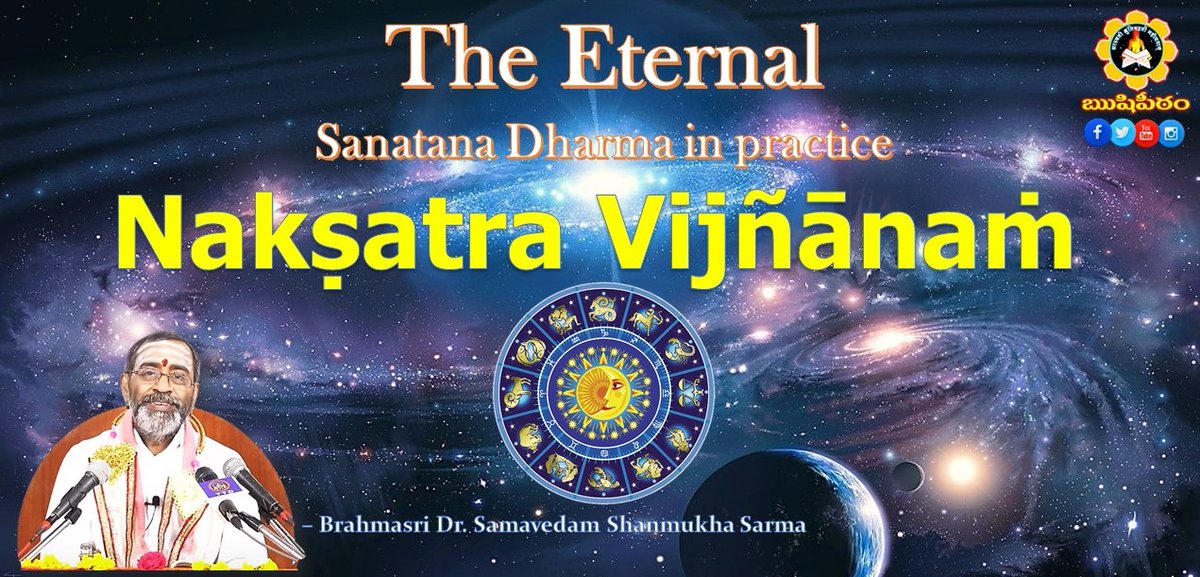
There is No dispute that Vēdic Astrology is the basis for many other forms currently prevalent in other parts of the world because of the presence of many common aspects. Even historical evidences prove the veracity and ancientness of Bhāratadēśa Jyōtirvijñānaṁ beyond any doubt. 
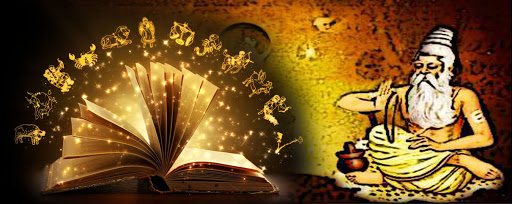
Jyōtiṣa is Vēdānga :
Jyōtiṣa is one among the Ṣaḍangās of Vēda, the other five being Śikṣa, Vyākarana, Candassu, Nirukta, and Kalpa. Many mantras related to stars are seen in Vēdās such as the mention of ‘Śaptaviśati Nakṣatrāni’ i.e. 27 stars.
Jyōtiṣa is one among the Ṣaḍangās of Vēda, the other five being Śikṣa, Vyākarana, Candassu, Nirukta, and Kalpa. Many mantras related to stars are seen in Vēdās such as the mention of ‘Śaptaviśati Nakṣatrāni’ i.e. 27 stars.
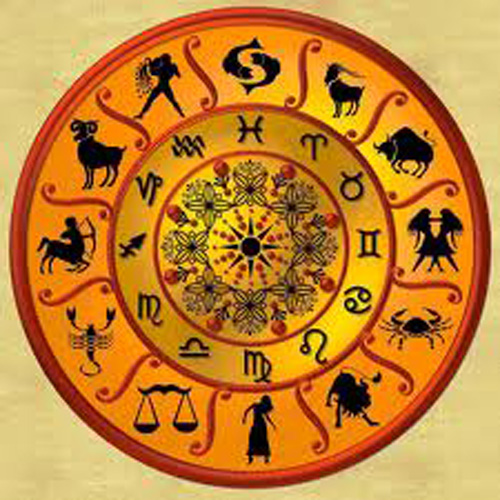
Different names of Stars :
Different names of stars such as ‘Nakṣatra’, ‘Tāraka’, R̥ukṣaṁ, Bham, Janaya:, and Tāra are seen in Vēdās, specifically in the portions of Yajurvēda Brahmānās.
Different names of stars such as ‘Nakṣatra’, ‘Tāraka’, R̥ukṣaṁ, Bham, Janaya:, and Tāra are seen in Vēdās, specifically in the portions of Yajurvēda Brahmānās.
Tāraka - salilaṁ vāyuvā idamantarāsīt yadataran tattārakānām tārakatvaṁ - This means coz the stars r radiating light beyond the waters filling the earth & hence Tāraka.
Nakṣatra - tam nakṣatrāṇāṁ nakṣatrattvaṁ yannakṣīyanti – That effulgence which is never destroyed.
Nakṣatra - tam nakṣatrāṇāṁ nakṣatrattvaṁ yannakṣīyanti – That effulgence which is never destroyed.
R̥ukṣaṁ - This is another name mentioned in Vēdās meaning stars.
Bham – ‘Bha’ means radiance. That which radiates light is ‘Bham’ i.e. star.
Tāra – ‘Tāra’ & ‘Tāraka’ mean the same.
Bham – ‘Bha’ means radiance. That which radiates light is ‘Bham’ i.e. star.
Tāra – ‘Tāra’ & ‘Tāraka’ mean the same.
Janaya: -
‘Nakṣatrāṇi vai janayō yēhi janā: puṇyakr̥tā:
svargaṁ lōkaṁ yanti tēṣām ētāni jyōtivinṣi’
says Śatapatha Brahmāna - That which is the form of light and takes the beings performing meritorious acts to heaven and other exalted worlds is ‘Janaya:’.
‘Nakṣatrāṇi vai janayō yēhi janā: puṇyakr̥tā:
svargaṁ lōkaṁ yanti tēṣām ētāni jyōtivinṣi’
says Śatapatha Brahmāna - That which is the form of light and takes the beings performing meritorious acts to heaven and other exalted worlds is ‘Janaya:’.
Stars – Formation & Influence
Stars did not form by accident. They all are sources of enormous divine energy. With the power of intense tapas and vision beyond the senses, Mahar̥ṣis realized the significant influence of these stars on cosmic objects such as planets & even on ..
Stars did not form by accident. They all are sources of enormous divine energy. With the power of intense tapas and vision beyond the senses, Mahar̥ṣis realized the significant influence of these stars on cosmic objects such as planets & even on ..

the significant influence of these stars on cosmic objects such as planets and even on all the species of life inhabiting the planet. The transformations in higher nature have direct relation to the movement of the stars.
Findings of modern science also corroborate to the same.
Findings of modern science also corroborate to the same.
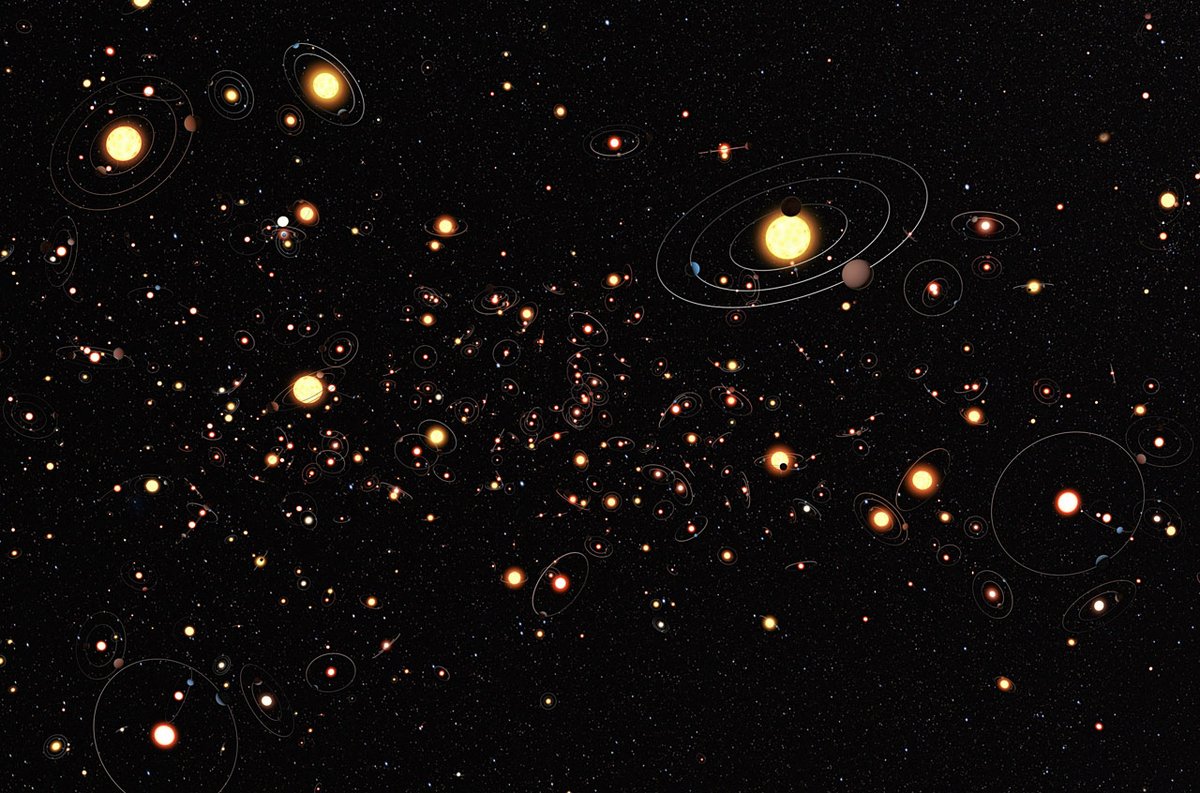
Distinct and deep knowledge
Based on the above, Vēdās stipulated the types of work that can be undertaken during the times when certain stars are present. For example, it is prescribed to undertake any work related to cattle when the star present is ‘Rēvati’. This is because..
Based on the above, Vēdās stipulated the types of work that can be undertaken during the times when certain stars are present. For example, it is prescribed to undertake any work related to cattle when the star present is ‘Rēvati’. This is because..
a mantra in Vēda mentions that Prajāpati created the cattle first in this star and hence their wealth shall increase if any work related to them is undertaken in the presence of this star.
Because of the profound effect of stars, even to this day, the influence of stars & moon..
Because of the profound effect of stars, even to this day, the influence of stars & moon..
is calculated while undertaking any auspicious work. There is an inherent relation between Moon and stars. All the calculations in a month are arranged based on the association of a particular star with moon. Moreover, Moon is the presiding deity for mind. Hence, the influence ..
..of moon along with the star present at a particular time determines the state of the mind.
Its common knowledge in India that birth & later life of a human being is heavily dependent upon the birth star, planetary position at the time of birth & other such astronomical factors
Its common knowledge in India that birth & later life of a human being is heavily dependent upon the birth star, planetary position at the time of birth & other such astronomical factors
Hence, for obtaining longevity or avoid any malefic planetary effects, the practice of worshipping the presiding deities of the birth star, doing japa to propitiate them, and later ending with the performance of Hōmam to all the stars is in vogue all over Bhāratadēśa since ages.
This entire process is called ‘Nakṣatrēṣṭhi’. It is interesting to note that the beginning of Nakṣatrēṣṭhi is done with the star Kr̥ttikā, not with Aświni.
Names & Significance
Nakṣatrās are divided into ‘Yama Dēvatāka’ Nakṣatra and ‘Dēvatā’ Nakṣatra.
Names & Significance
Nakṣatrās are divided into ‘Yama Dēvatāka’ Nakṣatra and ‘Dēvatā’ Nakṣatra.
Stars present from Anūrādha till Bharaṇi are called ‘Yama Dēvatāka’ Nakṣatra. All other stars present from Kr̥ittika are called ‘Dēvatāka’ Nakṣatra.
An allegorical story is mentioned about this division of Nakṣatra. During the war with demons, all the gods assembled.
An allegorical story is mentioned about this division of Nakṣatra. During the war with demons, all the gods assembled.
Based on their thoughts and corresponding progress about the different kinds of works to be undertaken under the presence of different stars, the stars are grouped.
For example, a few are mentioned below –
About the star Anūrādha it is said in Sayana Bhasya..
For example, a few are mentioned below –
About the star Anūrādha it is said in Sayana Bhasya..
..'anukūlayā rāddhayā sāmagri:’ i.e. all things convenient for the war are arranged when this star is present & hence its called ‘Anūrādha’.
The star present when it was agreed to kill the chief of the demons is called ‘Jyēṣṭa’. This star is also called ‘Jyēṣṭaghnē’ in Vēdās

The star present when it was agreed to kill the chief of the demons is called ‘Jyēṣṭa’. This star is also called ‘Jyēṣṭaghnē’ in Vēdās
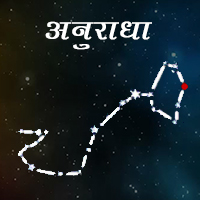

When it was decided to destroy the principal basis of strength for the demons, the star present is called ‘Mūla’ as defined by ‘mūlasya barhaṇaṁ uccēdā iti’. This star is also called ‘Mūla Barhiṣi’ in Vēdās.
When the demons thought that the atrocities of gods can’t be ..
When the demons thought that the atrocities of gods can’t be ..
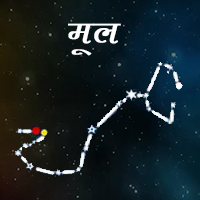
tolerated any further, the star is named ‘Āṣāḍha’ indicating lack of any more patience. These are further classified as ‘Uttarāṣāḍha’ and ’Pūrvāṣāḍha’.
When the entire clan of demons are destroyed, the star present is ‘Śravaṇa’. This star is primarily indicated for ..

When the entire clan of demons are destroyed, the star present is ‘Śravaṇa’. This star is primarily indicated for ..
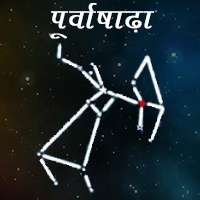
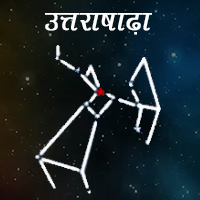
for Śrī Vēnkaṭēśwara Swāmi to connote the valor of the Lord in destroying the demonic forces. In Vēdās, this is also called ‘Śrōṇa’.
During the time when the star present is ‘Dhaniṣṭha’, gods spoke in derogatorily & insulted demons. This is also called ‘Śraviṣṭha’.

During the time when the star present is ‘Dhaniṣṭha’, gods spoke in derogatorily & insulted demons. This is also called ‘Śraviṣṭha’.
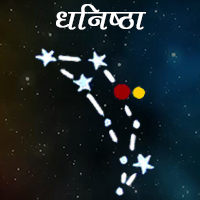
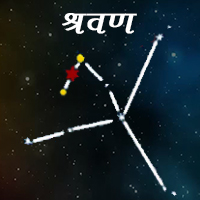
When gods readied all the weapons necessary for the war, the stars are called ‘prōṣṭhapada’ i.e. a combination of two stars - Pūrvābhādra & Uttarābhādra.
The star when the gods made loud sounds to terrify demons is called ‘Rēvati’.


The star when the gods made loud sounds to terrify demons is called ‘Rēvati’.
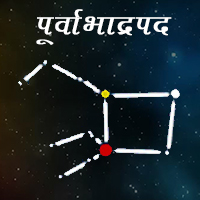

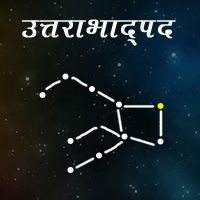
The star when the gods yoked horses to the chariot preparing for the battle is called ‘Aświni’. This star is also called ‘Aśwayugani’.
When all the gods were relieved of the torments of demons, the star is ‘Śatabhiṣaṁ’. ‘śataṁ dēvā abhiṣajanniti iti śatabhiṣaṁ’ says Vēdās.

When all the gods were relieved of the torments of demons, the star is ‘Śatabhiṣaṁ’. ‘śataṁ dēvā abhiṣajanniti iti śatabhiṣaṁ’ says Vēdās.

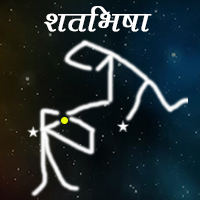
The star during which the demons fled away unable to bear the strength of demons is called ‘Bharaṇi’. In Vēdās, this star is also called ‘Apabharaṇi’.
Above eleven stars are called ‘Yama Dēvatāka’ Nakṣatra, because they are the cause of the destruction of demonic forces.
Above eleven stars are called ‘Yama Dēvatāka’ Nakṣatra, because they are the cause of the destruction of demonic forces.

Faith & Reverence
Apart from the allegorical story mentioned above, there are many other mantras that clearly mention characteristic features of each Nakṣatra in great detail. Many researches done in recent times fully substantiate these facts.
Infact, it’s not an exaggeration
Apart from the allegorical story mentioned above, there are many other mantras that clearly mention characteristic features of each Nakṣatra in great detail. Many researches done in recent times fully substantiate these facts.
Infact, it’s not an exaggeration
it’s not an exaggeration to mention that many western researches are looking for clues and tips from Bhāratīya Vijñānaṁ that will aid them to further expand their research studies into new horizons.
Many a times it’s done with cynical views dubbing all this ‘Vijñānaṁ’ as ..
Many a times it’s done with cynical views dubbing all this ‘Vijñānaṁ’ as ..
as not purposeful without even taking a peek into this enormous treasure. Implicit faith and absolute reverence are essential to comprehend this divine knowledge.
It is the duty of children and youth to make sure that they not only venerate this knowledge.. but also support those undertaking study of these sciences and themselves come forward to explore further.
The end.
The end.
• • •
Missing some Tweet in this thread? You can try to
force a refresh





